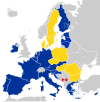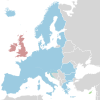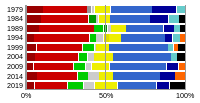Президент Европейского союза
В настоящее время, нет единого Президента Европейского союза. Вместе с тем он является неофициальным термином для двух должностей и теоретической должностью в рамках Лиссабонского договора.
Первый президент Европейского союза будет выбран 19 ноября 2009 года. [1]
Председатель Европейской комиссии
Председатель Европейской комиссии возглавляет исполнительный орган власти Европейского союза. Председатель контролирует всю исполнительную власть, её членов и Европейский гражданский сервис. Комиссия проектирует новые законы и рассматривает их на примере ежедневной жизни Союза (опираясь на бюджет и принимает решения). Комиссия также представляет ЕС в таких организациях как Всемирная Торговая Организация и G8.[2][3]
Председатель формально назначается министерством Совета Европейского союза (на практике, Советом Европы - главами государств-членов) каждые пять лет и его кандидатура одобряется Европейским парламентом, к которому относится Председатель (Парламент может выражать неодобрение работе Комиссии). Председатель в таком случае выбирает других Европейских комиссаров, вместе со странами-членами ЕС. После этого он передаёт обязанности каждому из них. До момента принятия ими всех дел, они обязаны выступить перед Парламентом.[2][3]
Although the Commission Presidency has sometimes been described as the President of the EU, it is more accurate to liken the position to being the European Prime Minister given the Union's cabinet style of government.[4][5] Under the Treaty of Lisbon, the President would be formally appointed by the European Council after taking into account the latest European elections.[6] This may lead to a greater link to the elections, for example the political parties each having a nomination and the winner being nominated by the European Council.[7][8][9]
Председатель Европейского совета
At present, the President-in-Office of the European Council is the member of the European Council belonging to the state which currently holds the Presidency of the Council of the European Union, which rotates every six months. The position has no executive powers, the President just chairs the Council and represents it, and the EU, abroad (attending G8 summits for example). Under the Treaty of Lisbon, the position would become a fixed, two-and-a-half year post held by someone appointed by the European Council members, to whom the President is accountable. It would gain no new executive powers however and would be primarily administrative. It would have defined foreign policy roles.[10][11] This position has attracted the name of "President of the European Union" the most in the media, especially in relation to who will be the first to fill the post.[12][13][14][15]
Relationship
At present the European Council President is a rather informal position but does, for example, attend the G8 summits alongside the Commission President. However as the role becomes more formalised under the Treaty of Lisbon, the relationship is expected to change. Given the strengthening of the European Council and its President, the two posts may clash on who is running the EU. Further more the two might to be from opposing political parties, creating a division on the direction of the EU (political majorities in the Council and Parliament rarely coincide).[16]
The dual executive nature of the positions has been compared to the French republic, where there is a President (the European Council President) and Prime Minister (the Commission President). However, unlike the French model, the European Council President does not hold formal powers such as the ability to directly appoint and sack the other, or the ability to dissolve Parliament. Hence while the European Council President may have prestige, it would lack power and while the Commission President would have power, it would lack the prestige of the former.[16]
The vagueness of the issue in the Treaty of Lisbon, and the overlapping job descriptions of not only the two Presidents but also the High Representative, has caused nervousness in Brussels over what will happen with the coming into force of the Treaty. The division between the European Council President and the High Representative is still unclear and the effect on the Commission as a whole, which the High Representative will be a part of, is another uncertainty concerning the establishment.[17]
Combined position
Under the Treaty of Lisbon the President of the European Council is barred from simultaneously holding a national office. This would mean that a national leader cannot be President at the same time, as they are today, however s/he is not barred from holding another Union-level office, notably the Commission Presidency. This is designed to allow for the two posts to be unofficially merged into a single executive office if the member states wish.[10][11]
It is unclear if or when this would be used but it would make the Commission more of a government, with the Council in practice no longer an independent body. The combined executive powers would be simpler and the President would gain the powers, legitimacy and prestige of both positions.[18]
См. также
Примечания
- ↑ Выборы президента
- ↑ 1 2 The European Commission. Europa (web portal). Дата обращения: 1 октября 2007.
- ↑ 1 2 Role and Powers. Europa (web portal). Дата обращения: 1 октября 2007.
- ↑ Rossant, John Commentary: Romano Prodi: Europe's First prime Minister? (int'l edition). Business Week (1999). Дата обращения: 1 октября 2007.
- ↑ James, Barry Prodi to have wide, new powers as head of the European Commission. International Herald Tribune (12 апреля 1999). Дата обращения: 1 октября 2007.
- ↑ Glossary: Democratic deficit. Europa (web portal). Дата обращения: 18 июня 2007.
- ↑ Mahony, Honor European politics to get more political. EU Observer (27 июня 2007). Дата обращения: 27 июня 2007.
- ↑ Spongenberg, Helena EU wants to dress up 2009 elections on TV. EU Observer (26 февраля 2007). Дата обращения: 8 июля 2007.
- ↑ Palmer, John Size shouldn't matter. The Guardian (10 января 2007). Дата обращения: 28 июня 2007.
- ↑ 1 2 Mulvey, Stephen A close look at the Reform Treaty. BBC News (3 августа 2007). Дата обращения: 1 октября 2007.
- ↑ 1 2 SCADPlus: The Institutions of the Union. Europa (web portal). Дата обращения: 1 октября 2007.
- ↑ Parker, George UK PM 'a serious candidate'. Financial Times (2007). Дата обращения: 27 июня 2007.
- ↑ Open Europe Blair for President of Europe! (2007). Дата обращения: 27 июня 2007.
- ↑ Mahony, Honor Ireland speculates on Ahern becoming EU president. EU Observer (27 августа 2007). Дата обращения: 12 июля 2007.
- ↑ Barnes, Eddie Blair touted as first president of Europe. The Scotsman (17 июня 2007). Дата обращения: 12 июля 2007.
- ↑ 1 2 Hix, Simon; Roland, Gérard Why the Franco-German Plan would institutionalise 'cohabitation' for Europe. Foreign Policy Centre. Дата обращения: 1 октября 2007.
- ↑ Magony, Honor Unclear EU treaty provisions causing 'nervousness'. EU Observer (28 ноября 2007). Дата обращения: 28 ноября 2007.
- ↑ Federal Trust Leading the Union: an argument in favour of a dual EU Presidency. Euractiv (8 июня 2003). Дата обращения: 1 октября 2007.
Внешние ссылки
- Slovenian Presidency eu2008.si
- Commission President ec.europa.eu





